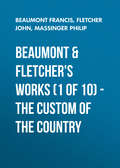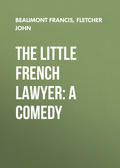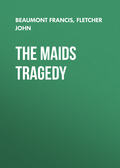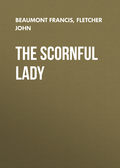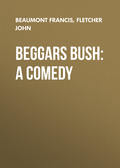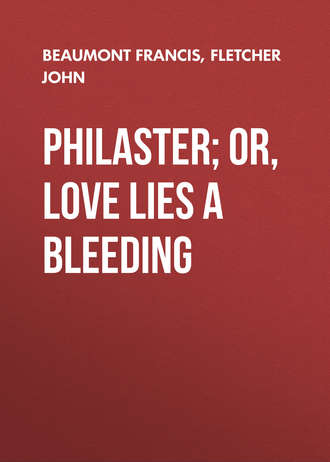
Beaumont Francis
Philaster; Or, Love Lies a Bleeding
Actus Tertius. Scena Prima
_Enter _Cle. Di. _and _Thra.
Cle. Nay doubtless 'tis true.
Di. I, and 'tis the gods
That rais'd this Punishment to scourge the King
With his own issue: Is it not a shame
For us, that should write noble in the land;
For us, that should be freemen, to behold
A man, that is the bravery of his age,
Philaster, prest down from his Royal right,
By this regardless King; and only look,
And see the Scepter ready to be cast
Into the hands of that lascivious Lady,
That lives in lust with a smooth boy, now to be
Married to yon strange Prince, who, but that people
Please to let him be a Prince, is born a slave,
In that which should be his most noble part,
His mind?
Thra. That man that would not stir with you,
To aid Philaster, let the gods forget,
That such a Creature walks upon the earth.
Cle. Philaster is too backward in't himself;
The Gentry do await it, and the people
Against their nature are all bent for him,
And like a field of standing Corn, that's mov'd
With a stiff gale, their heads bow all one way.
Di. The only cause that draws Philaster back
From this attempt, is the fair Princess love,
Which he admires and we can now confute.
Thra. Perhaps he'l not believe it.
Di. Why Gentlemen, 'tis without question so.
Cle. I 'tis past speech, she lives dishonestly. But how shall we, if he be curious, work Upon his faith?
Thra. We all are satisfied within our selves.
Di. Since it is true, and tends to his own good, I'le make this new report to be my knowledge, I'le say I know it, nay, I'le swear I saw it.
Cle. It will be best.
Thra. 'Twill move him.
[ Enter Philaster.
Di. Here he comes. Good morrow to your honour, We have spent some time in seeking you.
Phi. My worthy friends,
You that can keep your memories to know
Your friend in miseries, and cannot frown
On men disgrac'd for vertue: A good day
Attend you all. What service may I do worthy your
acceptation?
Di. My good Lord,
We come to urge that vertue which we know
Lives in your breast, forth, rise, and make a head,
The Nobles, and the people are all dull'd
With this usurping King: and not a man
That ever heard the word, or knew such a thing
As vertue, but will second your attempts.
Phi. How honourable is this love in you
To me that have deserv'd none? Know my friends
(You that were born to shame your poor Philaster,
With too much courtesie) I could afford
To melt my self in thanks; but my designs
Are not yet ripe, suffice it, that ere long
I shall imploy your loves: but yet the time is short of
what I would.
Di. The time is fuller Sir, than you expect;
That which hereafter will not perhaps be reach'd
By violence, may now be caught; As for the King,
You know the people have long hated him;
But now the Princess, whom they lov'd.
Phi. Why, what of her?
Di. Is loath'd as much as he.
Phi. By what strange means?
Di. She's known a Whore.
Phi. Thou lyest.
Di. My Lord—
Phi. Thou lyest,
[Offers to draw and is held.
And thou shalt feel it; I had thought thy mind
Had been of honour; thus to rob a Lady
Of her good name, is an infectious sin,
Not to be pardon'd; be it false as hell,
'Twill never be redeem'd, if it be sown
Amongst the people, fruitful to increase
All evil they shall hear. Let me alone,
That I may cut off falshood, whilst it springs.
Set hills on hills betwixt me and the man
That utters this, and I will scale them all,
And from the utmost top fall on his neck,
Like Thunder from a Cloud.
Di. This is most strange;
Sure he does love her.
Phi. I do love fair truth:
She is my Mistress, and who injures her,
Draws vengeance from me Sirs, let go my arms.
Thra. Nay, good my Lord be patient.
Cle. Sir, remember this is your honour'd friend,
That comes to do his service, and will shew you
Why he utter'd this.
Phi. I ask you pardon Sir,
My zeal to truth made me unmannerly:
Should I have heard dishonour spoke of you,
Behind your back untruly, I had been
As much distemper'd, and enrag'd as now.
Di. But this my Lord is truth.
Phi. O say not so, good Sir forbear to say so,
'Tis the truth that all womenkind is false;
Urge it no more, it is impossible;
Why should you think the Princess light?
Di. Why, she was taken at it.
Phi. 'Tis false, O Heaven 'tis false: it cannot be, Can it? Speak Gentlemen, for love of truth speak; Is't possible? can women all be damn'd?
Di. Why no, my Lord.
Phi. Why then it cannot be.
Di. And she was taken with her boy.
Phi. What boy?
Di. A Page, a boy that serves her.
Phi. Oh good gods, a little boy?
Di. I, know you him my Lord?
Phi. Hell and sin know him? Sir, you are deceiv'd;
I'le reason it a little coldly with you;
If she were lustful, would she take a boy,
That knows not yet desire? she would have one
Should meet her thoughts and knows the sin he acts,
Which is the great delight of wickedness;
You are abus'd, and so is she, and I.
Di. How you my Lord?
Phi. Why all the world's abus'd In an unjust report.
Di. Oh noble Sir your vertues Cannot look into the subtil thoughts of woman. In short my Lord, I took them: I my self.
Phi. Now all the Devils thou didst flie from my rage, Would thou hadst ta'ne devils ingendring plagues: When thou didst take them, hide thee from my eyes, Would thou hadst taken Thunder on thy breast, When thou didst take them, or been strucken dumb For ever: that this foul deed might have slept in silence.
Thra. Have you known him so ill temper'd?
Cle. Never before.
Phi. The winds that are let loose,
From the four several corners of the earth,
And spread themselves all over sea and land,
Kiss not a chaste one. What friend bears a sword
To run me through?
Di. Why, my Lord, are you so mov'd at this?
Phi. When any falls from vertue I am distract,
I have an interest in't.
Di. But good my Lord recal your self,
And think what's best to be done.
Phi. I thank you. I will do it;
Please you to leave me, I'le consider of it:
Tomorrow I will find your lodging forth,
And give you answer
The readiest way.
Di. All the gods direct you.
Thra. He was extream impatient.
Cle. It was his vertue and his noble mind.
[Exeunt Di. Cle. and Thra.
Phi. I had forgot to ask him where he took them,
I'le follow him. O that I had a sea
Within my breast, to quench the fire I feel;
More circumstances will but fan this fire;
It more afflicts me now, to know by whom
This deed is done, than simply that 'tis done:
And he that tells me this is honourable,
As far from lies, as she is far from truth.
O that like beasts, we could not grieve our selves,
With that we see not; Bulls and Rams will fight,
To keep their Females standing in their sight;
But take 'em from them, and you take at once
Their spleens away; and they will fall again
Unto their Pastures, growing fresh and fat,
And taste the waters of the springs as sweet,
As 'twas before, finding no start in sleep.
But miserable man; See, see you gods,
[Enter Bellario.
He walks still; and the face you let him wear
When he was innocent, is still the same,
Not blasted; is this justice? Do you mean
To intrap mortality, that you allow
Treason so smooth a brow? I cannot now
Think he is guilty.
Bell. Health to you my Lord;
The Princess doth commend her love, her life,
And this unto you.
Phi. Oh Bellario,
Now I perceive she loves me, she does shew it
In loving thee my boy, she has made thee brave.
Bell. My Lord she has attired me past my wish,
Past my desert, more fit for her attendant,
Though far unfit for me, who do attend.
Phi. Thou art grown courtly boy. O let all women
That love black deeds, learn to dissemble here,
Here, by this paper she does write to me,
As if her heart were Mines of Adamant
To all the world besides, but unto me,
A maiden snow that melted with my looks.
Tell me my boy how doth the Princess use thee?
For I shall guess her love to me by that.
Bell. Scarce like her servant, but as if I were
Something allied to her; or had preserv'd
Her life three times by my fidelity.
As mothers fond do use their only sons;
As I'de use one, that's left unto my trust,
For whom my life should pay, if he met harm,
So she does use me.
Phi. Why, this is wondrous well:
But what kind language does she feed thee with?
Bell. Why, she does tell me, she will trust my youth
With all her loving secrets; and does call me
Her pretty servant, bids me weep no more
For leaving you: shee'l see my services
Regarded; and such words of that soft strain,
That I am nearer weeping when she ends
Than ere she spake.
Phi. This is much better still.
Bell. Are you ill my Lord?
Phi. Ill? No Bellario.
Bell. Me thinks your words
Fall not from off your tongue so evenly,
Nor is there in your looks that quietness,
That I was wont to see.
Phi. Thou art deceiv'd boy:
And she stroakes thy head?
Bell. Yes.
Phi. And she does clap thy cheeks?
Bell. She does my Lord.
Phi. And she does kiss thee boy? ha!
Bell. How my Lord?
Phi. She kisses thee?
Bell. Not so my Lord.
Phi. Come, come, I know she does.
Bell. No by my life.
Phi. Why then she does not love me; come, she does,
I had her do it; I charg'd her by all charms
Of love between us, by the hope of peace
We should enjoy, to yield thee all delights
Naked, as to her bed: I took her oath
Thou should'st enjoy her: Tell me gentle boy,
Is she not paralleless? Is not her breath
Sweet as Arabian winds, when fruits are ripe?
Are not her breasts two liquid Ivory balls?
Is she not all a lasting Mine of joy?
Bell. I, now I see why my disturbed thoughts
Were so perplext. When first I went to her,
My heart held augury; you are abus'd,
Some villain has abus'd you; I do see
Whereto you tend; fall Rocks upon his head,
That put this to you; 'tis some subtil train,
To bring that noble frame of yours to nought.
Phi. Thou think'st I will be angry with thee; Come
Thou shalt know all my drift, I hate her more,
Than I love happiness, and plac'd thee there,
To pry with narrow eyes into her deeds;
Hast thou discover'd? Is she fain to lust,
As I would wish her? Speak some comfort to me.
Bell. My Lord, you did mistake the boy you sent:
Had she the lust of Sparrows, or of Goats;
Had she a sin that way, hid from the world,
Beyond the name of lust, I would not aid
Her base desires; but what I came to know
As servant to her, I would not reveal, to make
my life last ages.
Phi. Oh my heart; this is a salve worse than the main disease.
Tell me thy thoughts; for I will know the least
That dwells within thee, or will rip thy heart
To know it; I will see thy thoughts as plain,
As I do know thy face.
Bell. Why, so you do.
She is (for ought I know) by all the gods,
As chaste as Ice; but were she foul as Hell
And I did know it, thus; the breath of Kings,
The points of Swords, Tortures nor Bulls of Brass,
Should draw it from me.
Phi. Then 'tis no time to dally with thee;
I will take thy life, for I do hate thee; I could curse
thee now.
Bell. If you do hate you could not curse me worse;
The gods have not a punishment in store
Greater for me, than is your hate.
Phi. Fie, fie, so young and so dissembling;
Tell me when and where thou di[d]st enjoy her,
Or let plagues fall on me, if I destroy thee not.
Bell. Heaven knows I never did: and when I lie
To save my life, may I live long and loath'd.
Hew me asunder, and whilst I can think
I'le love those pieces you have cut away,
Better than those that grow: and kiss these limbs,
Because you made 'em so.
Phi. Fearest thou not death?
Can boys contemn that?
Bell. Oh, what boy is he Can be content to live to be a man That sees the best of men thus passionate, thus without reason?
Phi. Oh, but thou dost not know what 'tis to die.
Bell. Yes, I do know my Lord;
'Tis less than to be born; a lasting sleep,
A quiet resting from all jealousie;
A thing we all pursue; I know besides,
It is but giving over of a game that must be lost.
Phi. But there are pains, false boy,
For perjur'd souls; think but on these, and then
Thy heart will melt, and thou wilt utter all.
Bell. May they fall all upon me whilst I live,
If I be perjur'd, or have ever thought
Of that you charge me with; if I be false,
Send me to suffer in those punishments you speak of;
kill me.
Phi. Oh, what should I do?
Why, who can but believe him? He does swear
So earnestly, that if it were not true,
The gods would not endure him. Rise Bellario,
Thy protestations are so deep; and thou
Dost look so truly, when thou utterest them,
That though I [know] 'em false, as were my hopes,
I cannot urge thee further; but thou wert
To blame to injure me, for I must love
Thy honest looks, and take no revenge upon
Thy tender youth; A love from me to thee
Is firm, what ere thou dost: It troubles me
That I have call'd the blood out of thy cheeks,
That did so well become thee: but good boy
Let me not see thee more; something is done,
That will distract me, that will make me mad,
If I behold thee: if thou tender'st me,
Let me not see thee.
Bell. I will fly as far
As there is morning, ere I give distaste
To that most honour'd mind. But through these tears
Shed at my hopeless parting, I can see
A world of Treason practis'd upon you,
And her and me. Farewel for evermore;
If you shall hear, that sorrow struck me dead,
And after find me Loyal, let there be
A tear shed from you in my memorie,
And I shall rest at peace.
[Exit Bel.
Phi. Blessing be with thee,
What ever thou deserv'st. Oh, where shall I
Go bath thy body? Nature too unkind,
That made no medicine for a troubled mind!
[Exit. Phi.
Enter Arethuse.
Are. I marvel my boy comes not back again;
But that I know my love will question him
Over and over; how I slept, wak'd, talk'd;
How I remembred him when his dear name
Was last spoke, and how, when I sigh'd, wept, sung,
And ten thousand such; I should be angry at his stay.
[_Enter _King.
King. What are your meditations? who attends you?
Are. None but my single self, I need no Guard, I do no wrong, nor fear none.
King. Tell me: have you not a boy?
Are. Yes Sir.
King. What kind of boy?
Are. A Page, a waiting boy.
King. A handsome boy?
Are. I think he be not ugly: Well qualified, and dutiful, I know him, I took him not for beauty.
King. He speaks, and sings and plays?
Are. Yes Sir.
King. About Eighteen?
Are. I never ask'd his age.
King. Is he full of service?
Are. By your pardon why do you ask?
King. Put him away.
Are. Sir?
King. Put him away, h'as done you that good service, Shames me to speak of.
Are. Good Sir let me understand you.
King. If you fear me, shew it in duty; put away that boy.
Are. Let me have reason for it Sir, and then
Your will is my command.
King. Do not you blush to ask it? Cast him off,
Or I shall do the same to you. Y'are one
Shame with me, and so near unto my self,
That by my life, I dare not tell my self,
What you, my self have done.
Are. What have I done my Lord?
King. 'Tis a new language, that all love to learn,
The common people speak it well already,
They need no Grammer; understand me well,
There be foul whispers stirring; cast him off!
And suddenly do it: Farewel.
[Exit King.
Are. Where may a Maiden live securely free,
Keeping her Honour safe? Not with the living,
They feed upon opinions, errours, dreams,
And make 'em truths: they draw a nourishment
Out of defamings, grow upon disgraces,
And when they see a vertue fortified
Strongly above the battery of their tongues;
Oh, how they cast to sink it; and defeated
(Soul sick with Poyson) strike the Monuments
Where noble names lie sleeping: till they sweat,
And the cold Marble melt.
Enter Philaster.
Phi. Peace to your fairest thoughts, dearest Mistress.
Are. Oh, my dearest servant I have a War within me.
Phi. He must be more than man, that makes these Crystals
Run into Rivers; sweetest fair, the cause;
And as I am your slave, tied to your goodness,
Your creature made again from what I was,
And newly spirited, I'le right your honours.
Are. Oh, my best love; that boy!
Phi. What boy?
Are. The pretty boy you gave me.
Phi. What of him?
Are. Must be no more mine.
Phi. Why?
Are. They are jealous of him.
Phi. Jealous, who?
Are. The King.
Phi. Oh, my fortune,
Then 'tis no idle jealousie. Let him go.
Are. Oh cruel, are you hard hearted too?
Who shall now tell you, how much I lov'd you;
Who shall swear it to you, and weep the tears I send?
Who shall now bring you Letters, Rings, Bracelets,
Lose his health in service? wake tedious nights
In stories of your praise? Who shall sing
Your crying Elegies? And strike a sad soul
Into senseless Pictures, and make them mourn?
Who shall take up his Lute, and touch it, till
He crown a silent sleep upon my eye-lid,
Making me dream and cry, Oh my dear, dear Philaster.
Phi. Oh my heart!
Would he had broken thee, that made thee know
This Lady was not Loyal. Mistress, forget
The boy, I'le get thee a far better.
Are. Oh never, never such a boy again, as my Bellario.
Phi. 'Tis but your fond affection.
Are. With thee my boy, farewel for ever,
All secrecy in servants: farewel faith,
And all desire to do well for it self:
Let all that shall succeed thee, for thy wrongs,
Sell and betray chast love.
Phi. And all this passion for a boy?
Are. He was your boy, and you put him to me, And the loss of such must have a mourning for.
Phi. O thou forgetful woman!
Are. How, my Lord?
Phi. False Arethusa! Hast thou a Medicine to restore my wits, When I have lost 'em? If not, leave to talk, and do thus.
Are. Do what Sir? would you sleep?
Phi. For ever Arethusa. Oh you gods,
Give me a worthy patience; Have I stood
Naked, alone the shock of many fortunes?
Have I seen mischiefs numberless, and mighty
Grow li[k]e a sea upon me? Have I taken
Danger as stern as death into my bosom,
And laught upon it, made it but a mirth,
And flung it by? Do I live now like him,
Under this Tyrant King, that languishing
Hears his sad Bell, and sees his Mourners? Do I
Bear all this bravely, and must sink at length
Under a womans falshood? Oh that boy,
That cursed boy? None but a villain boy, to ease
your lust?
Are. Nay, then I am betray'd,
I feel the plot cast for my overthrow; Oh I am wretched.
Phi. Now you may take that little right I have
To this poor Kingdom; give it to your Joy,
For I have no joy in it. Some far place,
Where never womankind durst set her foot,
For bursting with her poisons, must I seek,
And live to curse you;
There dig a Cave, and preach to birds and beasts,
What woman is, and help to save them from you.
How heaven is in your eyes, but in your hearts,
More hell than hell has; how your tongues like Scorpions,
Both heal and poyson; how your thoughts are woven
With thousand changes in one subtle webb,
And worn so by you. How that foolish man,
That reads the story of a womans face,
And dies believing it, is lost for ever.
How all the good you have, is but a shadow,
I'th' morning with you, and at night behind you,
Past and forgotten. How your vows are frosts,
Fast for a night, and with the next sun gone.
How you are, being taken all together,
A meer confusion, and so dead a Chaos,
That love cannot distinguish. These sad Texts
Till my last hour, I am bound to utter of you.
So farewel all my wo, all my delight.
[Exit Phi.
Are. Be merciful ye gods and strike me dead;
What way have I deserv'd this? make my breast
Transparent as pure Crystal, that the world
Jealous of me, may see the foulest thought
My heart holds. Where shall a woman turn her eyes,
To find out constancy? Save me, how black,
[Enter Bell.
And guilty (me thinks) that boy looks now?
Oh thou dissembler, that before thou spak'st
Wert in thy cradle false? sent to make lies,
And betray Innocents; thy Lord and thou,
May glory in the ashes of a Maid
Fool'd by her passion; but the conquest is
Nothing so great as wicked. Fly away,
Let my command force thee to that, which shame
Would do without it. If thou understoodst
The loathed Office thou hast undergone,
Why, thou wouldst hide thee under heaps of hills,
Lest men should dig and find thee.
Bell. Oh what God
Angry with men, hath sent this strange disease
Into the noblest minds? Madam this grief
You add unto me is no more than drops
To seas, for which they are not seen to swell;
My Lord had struck his anger through my heart,
And let out all the hope of future joyes,
You need not bid me fly, I came to part,
To take my latest leave, Farewel for ever;
I durst not run away in honesty,
From such a Lady, like a boy that stole,
Or made some grievous fault; the power of gods
Assist you in your sufferings; hasty time
Reveal the truth to your abused Lord,
And mine: That he may know your worth: whilst I
Go seek out some forgotten place to die.
[Exit Bell.
Are. Peace guide thee, th'ast overthrown me once,
Yet if I had another Troy to lose,
Thou or another villain with thy looks,
Might talk me out of it, and send me naked,
My hair dishevel'd through the fiery streets.
[ Enter a Lady
La. Madam, the King would hunt, and calls for you With earnestness.
Are. I am in tune to hunt! Diana if thou canst rage with a maid, As with a man, let me discover thee Bathing, and turn me to a fearful Hind, That I may die pursu'd by cruel Hounds, And have my story written in my wounds.



